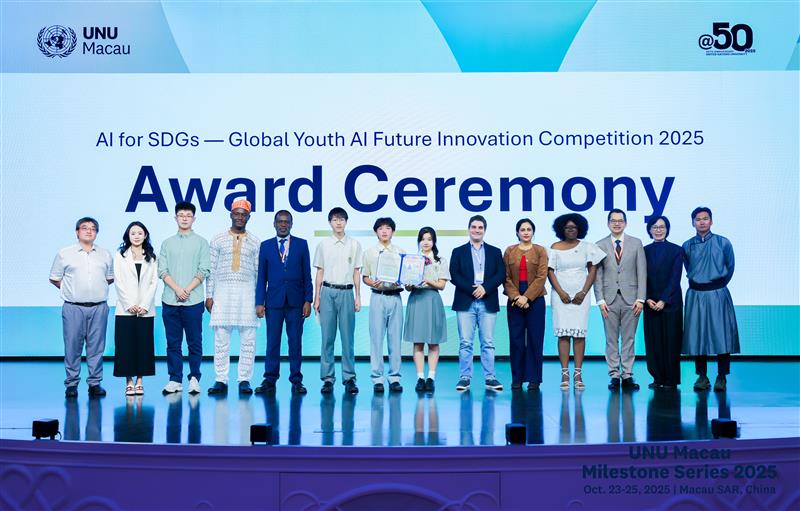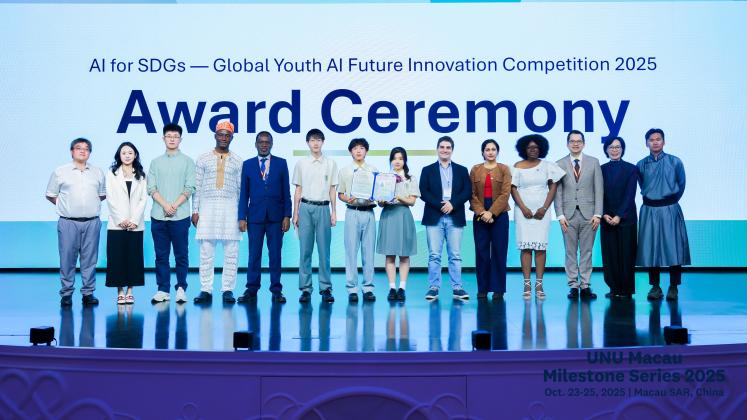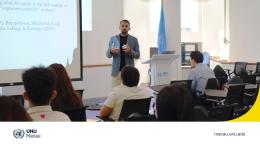The AI for SDGs – Global Youth AI Future Innovation Competition 2025 concluded with the announcement of five winning teams, each recognized for their contributions to sustainable development through artificial intelligence. The final awards were presented at the UN80 and UNUat50 Celebration Dinner, held at Wynn Palace and sponsored by Wynn.
This year’s competition focused on “AI for the Environment: Ecological Environment and Green Transition Challenges.” It received 131 proposals from 47 countries, including 36 submissions from the Global South, reflecting the commitment of young people to address environmental and development challenges in their communities.
After a competitive review process, 12 international teams were selected for the final round. They were joined by 3 local youth teams from Macao, nominated by the Macau Computer Society. On October 23, all 15 teams presented their AI-based solutions at The Londoner Macao, with Sands China Ltd. as the venue sponsor.

2025 Winners
Climate Change Adaptation
HUNU Climate Tech – Mongolia
Blending traditional herding knowledge with modern AI, Hunu developed a herder companion app with GPS, weather alerts, and government updates, alongside a drone-compatible livestock counting model and digital literacy workshops for young nomads.
Environmental Protection and Conservation
Green Leaf AI – Morocco
Green Leaf empowers farmers to detect palm tree diseases early and optimize resources through AI-powered tools for crop protection and sustainable agriculture, revolutionizing farming practices across Morocco and beyond.
AI for Less Developed Countries
Delibera – Singapore
Delibera is an AI-powered deliberation platform designed to make inclusive public dialogue affordable and accessible, especially in less developed countries—advancing civic participation through scalable technology.
AI for Less Developed Countries
VRAI AI - France
VRAI AI’s smartphone-based counterfeit medicine detection system boasts 99.71% accuracy and has already impacted 12.6 million patient profiles globally. With no need for physical tags, it offers scalable, low-cost protection against fake pharmaceuticals.
Special Macau Prize
Plant Nutrition Auto-Dosing System – Macau SAR, China
Developed by the Affiliated School of the University of Macau, this smart agriculture system uses image recognition to diagnose plant nutrient deficiencies and automate irrigation—advancing precision farming and local innovation.
The awards were presented by Professor Tshilidzi Marwala, Rector of the United Nations University and United Nations Under-Secretary-General; Dr. Vincent U, President of the Administrative Committee of the Science and Technology Development Fund; and Ms. Catherine Kong, Vice President of Corporate Communications and Community Affairs for Sands China Ltd.
“This competition highlights the important role of young people in shaping innovative solutions to global challenges,” said Professor Marwala. “Each team has shown how AI can be applied to real-world problems in ways that are thoughtful, inclusive, and effective.”
Winning teams will receive cash awards and follow-up support, including pilot opportunities in China to help bring their ideas into practice.
The competition was part of the UNU Macau Milestone Series, marking the 80th anniversary of the United Nations and the 50th anniversary of the United Nations University. It placed youth innovation at the center of efforts to advance the Sustainable Development Goals, especially in areas such as climate action, clean energy, and reducing inequality.
The competition was guided by the United Nations University and organized by the UNU Global AI Network. It was co-organized by UNU Macau and Venture Cup China, with academic support from the Institute for AI International Governance at Tsinghua University. The Macao local track was organized by the Macau Computer Society.
The competition was hosted by Sands China Ltd. as the venue sponsor.
Learn more about the competition: https://unu.edu/macau/youthaicompetition
Learn more about UNU Macau: https://unu.edu/macau
Learn more about the UNU Global AI Network: https://unu.edu/unu-global-ai-network



